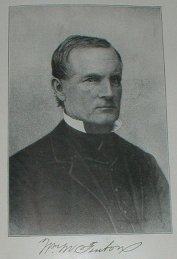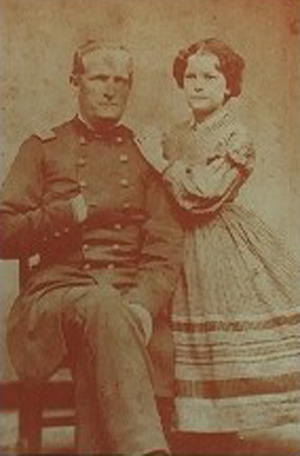|
| C;ick on Image for actual size |

|
American Biographical History of Eminent and Self-Made Men with Portrait Illustrations on Steel, Volumes I-II
Name:
Hon. William M. Fenton
of Flint, Michigan, was born in Norwich, Chenango County, New York, December 19,
1808. He graduated from Hamilton College, in 1826, at the head of his class; and, within a year, sailed from Charleston, South
Carolina, as a common sailor. Four years later, he became first mate of a merchantman, and received the offer of a Captaincy
on a similar vessel, which he declined to accept. In April, 1835, he married a daughter of Judge Birdsall, of Norwich, New
York; and, in July, settled in Pontiac, Michigan. In 1837 he removed to Genesee County, and engaged in mercantile milling,
and in real estate transactions in the village of Fenton, which bears his name. In 1842 he was admitted to the bar. In 1844
he was Democratic candidate for Representative in the State Legislature, for Genesee County, but was defeated. In 1846 he
was elected to the State Senate, from the district composing the counties of Genesee, Oakland, Macomb, and Livingston. While
in the Legislature he was instrumental in securing the establishment of the State Institute for the Deaf and Dumb, and its
location at Flint. In 1848 and 1850, he was elected Lieutenant-Governor. In 1852 he was appointed, by President Pierce, Register
of the Land-office at Flint, and held the position until the office was removed to Saginaw. He was Mayor of Flint for one
year. On the breaking out of the civil war, he used his whole influence to sustain the Union. In 1861, knowing that difficulties
of a financial nature involved the Government, he telegraphed to Governor Blair that five thousand dollars of his private
means were at the disposal of the State, for the equipment of Michigan troops. Early in 1861 he was chosen Major of the 7th
Michigan Infantry; but, before being mustered in with that rank, he was commissioned, by Governor Blair, Colonel of the 8th
Michigan Infantry. This regiment was raised, equipped, drilled, and led to the front with remarkable celerity, leaving the
State September 27, 1861. Colonel Fenton possessed extraordinary organizing and executive force, and entered upon his work
with such zeal and energy as to inspire every man in the regiment with a similar spirit; as a result, the most perfect discipline
was soon obtained. The regiment embarked at Annapolis, Maryland, soon after arriving at the front, as part of the expedition
to Hilton Head, under General G. W. Sherman; and had its first battle at Port Royal, November 7, 1861. It participated in
numerous engagements afterwards. One of the most noted occurred April 16, 1862, on the reconnoissance made from on board the
steamer "Honduras," by Colonel Fenton, at Wilmington Island, Georgia. After landing, they encountered the 13th Georgia Regiment,
about eight hundred strong, armed with Enfield rifles, and drove them from the field in confusion. On the 16th of June following,
they took part in one of the most dashing assaults of the war,-- an attack upon the enemy's works at Secessionville, James
Island, South Carolina, in which Colonel Fenton led a brigade, composed of the 8th Michigan, 7th Connecticut, and 28th Massachusetts
regiments. The 8th Michigan lost one hundred and eighty-five men, out of five hundred and thirty-five engaged. After this
the regiment was in active service at Bull Run; Chantilly; Jackson, Mississippi; Campbell Station; the Wilderness; Spottsylvania
Court House; Cold Harbor; Welden Road; and many other places. From its almost numberless journeys and battles, it was named
the "Itinerant Regiment." After two years incessant service in the field, Colonel Fenton was obliged to resign his commission
on account of his health. On his return home, he became Democratic candidate for Governor, but was defeated, and devoted himself
to his profession and to the details of his private business. He erected the block of stores and the public hall which bear
his name. In 1868 his wife, who, for more than thirty years, had shared his trials and triumphs, was called home. On the organization
of the present city government of Flint, Colonel Fenton was chosen Chief-Engineer of the Fire Department. His zeal in this
office led to his death, November 12, 1871. On the night previous he was summoned by an alarm of fire, and ran against a post
with such force as to inflict internal injury and cause his death in twenty-four hours. This event cast a gloom over the entire
city. Resolutions, expressive of the great sorrow felt by the community, were adopted at a public meeting of citizens. Similar
resolutions were adopted by the members of the bar; the Common Council of Flint; the Fire Department; and the Knights Templar
Commandery, of which he was a member. On the day of his funeral, most of the business places in Flint were closed, and nearly
all of them draped in mourning. Mr. Fenton was a ripe scholar, an able lawyer, and a wise counselor. The elements of true
manhood were combined in his character in such nearly perfect proportions that, as a man, neighbor, friend, and Christian
gentleman, he won the entire confidence of his fellow-citizens. He left a family of four children.
| Click on Image for actual size |

|
Photo: Colonel William M. Fenton and his daughter Adelaide.
|

